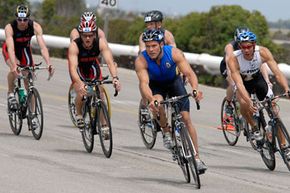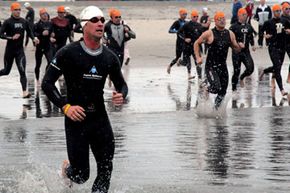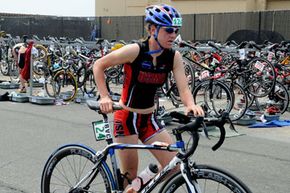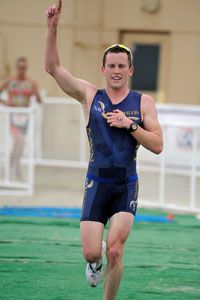Perhaps the greatest difference between triathletes' nutritional needs and those of regular folks is the timing involved. Eating for a triathlon is just as much about when you're eating as about what you're eating.
A triathlete's nutrition plan doesn't just kick in on race day. It's a daily commitment that begins with training and carries through until well after the race.
Training
During training, nutrition is about balance and quantity: Eating a variety of foods from each food group, and eating enough of them to counter the amount of energy going out. This means adjusting intake on a daily basis depending on training schedule. A six-hour training day requires a greater number of calories than a two-hour training day.
Fluid is absolutely crucial at every stage, and a good way to know there are enough fluids going in is to weigh in before and after a training session. A triathlete should be drinking 24 ounces of water for each pound loss during training [source: MTP].
Race Lead-up
In the days leading up to an event, there's a shift. Three-to-four days before a race, carb loading begins. Fluids also increase. It's important, though, not to overdo the fluids, which can result in electrolyte imbalance. A good way to know fluids are appropriate is to look at the color of urine: It should be very light yellow. Too dark means not enough water, no yellow at all means too much.
The Race
On the morning of the race, typically about three hours before the event, a triathlete eats a large meal consisting of carbohydrates -- at least 200 grams of them -- and at least 16 ounces of non-caffeinated fluids [source: MTP]. A triathlete should be drinking from the time of that meal all the way up to the race.
During a triathlon, energy reserves will have to be topped off, as there is no way to consume enough energy for the entire event beforehand. High-carbohydrate snacks, including supplement bars and gels, will be useful through the race, about 30 grams of carbs per for each hour racing [source: MTP]. It's best to limit them during the jogging portion, though (which is the final leg), since the intense movement of running can cause stomach upset.
Recovery
Recovery is as important as training and racing -- a triathlon is a huge strain on the body. Muscles need food to recover from the stress. Fluids are essential. Drink 24 ounces for each pound lost during the race, as estimated during training.
Within one and a half or two hours (or even 30 to 45 minutes, according to some endurance coaches) after racing and training, triathletes should consume carbohydrates, including carb-loaded sports drinks. Muscles are still converting glycogen to energy, and they need fuel to do so. The goal is 1 gram of carbohydrate per kilogram body weight immediately after the race, and about 25 grams per hour for the next 24 hours [source: MTP].
While the specifics of timing, balance and intake are important, the overall goal of any nutrition plan, including one for triathletes, is the same: satisfaction of appetite, consistent body weight, high energy levels and a general feeling of health and wellbeing. To this end, daily food logs can be extremely helpful. Every body is different, and it can take trial-and-error to find the best individual triathlon nutrition plan.
It's a lot of time and effort, but the performance spike that comes from fueling up just right can be worth every minute of it.



